Intro
Here's a few reviews that I've gone ahead and mirrored from my RYM account, DoYouLikeVeggies, plus all of the reviews from my AlbumOfTheYear account, DoYaLikeVeggies, which is DEAD.
Tommy Roe - Sweet Pea (1966)
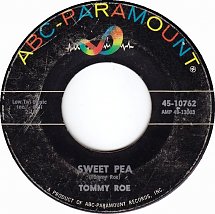
While starting his career out sounding a lot like a mediocre Buddy Holly ripoff, by the beginning of 1966, Tommy Roe had slipped into a rut of writing effervescent pop songs that had decent hooks, but absolutely zero substance. He hadn't had a charting single in the States for over a year, the last being the middling Party Girl from 1964, which reached number 85 on the Billboard Hot 100. Sweet Pea ended up being a massive breakout hit for Roe, going all the way up to number 8 on the Hot 100. However, this sudden turn of chart fortune wasn't due to any particular improvement in Roe's songwriting. In fact, this song is one of the earliest examples of my least favorite songwriting quirk of his, which is taking the already tedious step-up modulation that every too-long pop song uses to try and fake a tiny bit of interest and applies it TWICE (!!) in the same song. Now i know he didn't invent this concept, and frankly, I probably hate it more than even you do, but it's one of the reasons that this song lodged itself into so many teenybopper's ears. The other reason this song's so damn catchy is because of the excellent drum break, which has been sampled countless times in hip hop. Now, since we all know that Tommy Roe is, for a lack of a better term, a hack, who could we credit this amazing break to? Due to the lack of a production credit, the real answer is ambiguous upon first blush. There are three candidates for our consideration. Gary S. Paxton, Steve Clark, and Curt Boettcher. Gary S. Paxton can be immediately eliminated, as while he almost certainly was involved with the single as engineer, the only source I've seen which claims he was the main producer is Wikipedia, which cites a source which says no such thing. Steve Clark has the lion's share of production credits from when Tommy Roe collaborated with Our Productions, but Steve Clark was worse than a hack, he was a professional fraudster, who consistently failed to credit the hero of our story, Curt Boettcher with many deserving production credits on multiple projects, and he went uncredited on many projects he worked on with Roe. Frankly, the fact that Curt even claimed to produce a song that's this mid makes me wanna believe him. BUT WAIT!!! No one talks about Victoria Winston, who was Curt's totally uncredited partner in crime for around the first year of Our Productions's existence, who's only known now for being the other half of Curt's Summer's Children outfit. This stuff goes deep, phew.
Tommy Roe - Hooray for Hazel (1966)
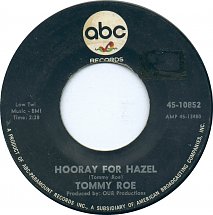
This is probably the most blatant case of "ok let's just make the hit AGAIN and see if it still charts" I have ever seen in music. Literally everything I've said about Sweet Pea can be applied to this single as well. The only difference here is the addition of some incredibly quiet backing vocals around halfway through the song.
Your Gang - S/T (1967)
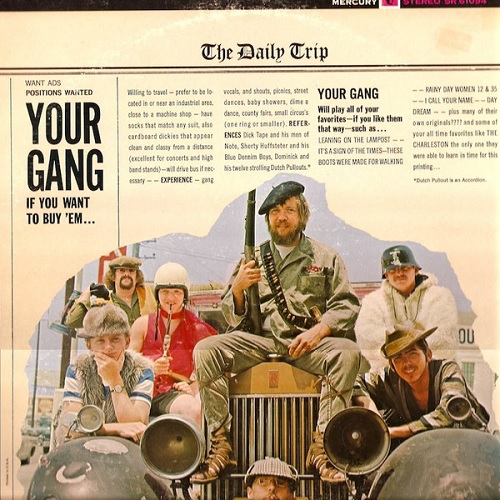
A very strange album indeed
The sessions of this album strike me as being a very similar situation to The Wichita Train Whistle Sings, with a bunch of drunk session musicians jamming out to previously written out tunes. Unfortunately, unlike Wichita Train Whistle, they didn't have a songwriter like Michael Nesmith to base all of the songs around (as the person who really championed this project was producer & professional business scammer Steve Clark), so what we have here is, as a contemporary review put it, "dixieland cum revival meeting renditions" of a lot of then currently popular songs, with a few contributions by the members. This sounds about as depressing as you'd expect, and there's cuts on here like I Call Your Name, These Boots Are Made For Walking, and Rainy Day Women 12 & 35, which aren't great listening experiences. Probably the most interesting track on here is Tomorrow's Dreams, which was written by then pop wunderkind Curt Boettcher, but even this track feels like a throwaway. Very strange novelty album, but one I really cannot recommend. If you ever find yourself interested in getting a copy of this though, the prices aren't bad, though that's probably an indication of how boring this thing is.
Eternity's Children - S/T (1968)
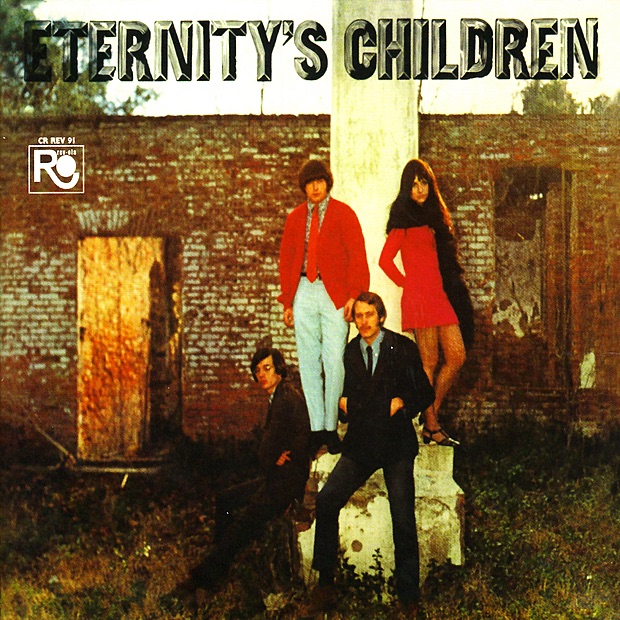
Curt Boettcher and Keith Olsen for hire
This album, the first by the eponymous group, is another of far too many of these Boettcher produced albums which has a history which seriously contrasts with the music on the record. This group had the seriously unfortunate luck of being saddled with incredibly bad management courtesy of Crocked Foxxes, comprising of Ray Roy (i didn't think that was a real name at first!) and Guy Belello. To keep things short, and you can find more details even on Wikipedia, the group practically imploded during the recording of this album, losing three members due to artistic disagreements between members, and "meddling" by management which I've never seen fully described in detail, though it should be noted that the false "Karl Marion" credits were not the reason they left, being added as an incredibly petty form of revenge against the departed members.
With the group actively falling apart in real time, it's no wonder than the album ended up becoming less of a real representation of the group's abilities, and more of a side project for Curt Boettcher and Keith Olsen, who at this point had became the main creative drivers of the project. This album was recorded right in the middle of both the production of Present Tense AND Begin, which i should note were also overlapping productions. This made the album a chief priority for pretty much nobody, but the resulting product is solid enough to obscure this fact, at first blush.
Three of the songs (on a very short 10 track album!) are directly taken from other projects Curt was either working on or closely associated with at the time, and have nothing to do with the group's own work. Rupert White reuses the basic track from an already released single by The Chocolate Tunnel, Flowers, while being an original track for the album, was written by the Millennium's own star songwriter Mike Fennelly, and You Know I've Found A Way is literally just a demo for the then unreleased Sagittarius track.
One thing I can certainly say that Curt and co. did not slack on is the production of this album, which is top notch throughout, at least on the tracks which weren't directly lifted from other projects. Your World in particular stands out for having both killer production and some beautiful harmony stacks, courtesy of Curt himself, naturally. Also worth a mention is the lead single, Mrs. Bluebird, which might be the definitive sunshine pop song, with those broken triplet chords which seem to be imitated in nearly every sunshine pop pastiche from the 90's onward, as well as that blazing fuzz guitar solo, which simply elevates the song to another level. All in all, I genuinely love this album, even if it's a patched together mess. I just wish that copies of this album didn't cost $400 or more. Where's that reissue at???
The Millenium - Begin (1968)

Unending sadness, unending joy
God. If you know me at all, you've probably heard me gush about how much I love this album. Being the person who's obsessed with Curt Boettcher is probably one of my main traits at this point. Saying this, it's been way too long for me to not talk about this album, but how do you talk about something you know way too much about? What angle of attack can you take that will convince others of the way that it makes you feel? I'm not sure how I'll pull off that goal, but I can certainly take a stab at it.
Firstly, we have to talk about the members of this group. There's seven of them, plus an additional crypto-member in co-producer Keith Olsen, so this is gonna take a hot minute. I'll try to be as brief as I can, and I'll start with the members whose deal can be explained the fastest.
The first two members I'll talk about are Doug Rhodes and Ron Edgar. These guys were pretty much stolen outright from the line-up of The Music Machine, along with Keith Olsen (we will simply ignore Ron and Keith both being involved with Curt's first group, The Goldebriars), which caused said group to implode upon itself to become the Bonniwell Music Machine. I'm guessing the name change is a hint as to why they were so easily stolen from that group. Both of these guys were fantastic musicians, Ron being the group's main drummer and Doug being an incredibly versatile multi-instrumentalist (keyboards, bass, and tuba as far as i know, but there's probably an instrument I'm missing). These guys are at the bottom of the list, but they were so outstandingly talents that everyone in the group felt obligated to let them make a track for the album, which became Prelude, so it's not like they weren't heavy hitters.
Next on the list is Joey Stec. I really don't like Joey very much, due to actions he committed decades in the future, but at this time he's one of the main songwriters for the group (co-writing with Mike Fennelly), so I begrudgingly accept his role as a key part of the group's formula. He's also apparently a pretty good guitarist, but frankly I can't tell who the hell plays the guitar leads on this album half the time anyway.
Moving onto less annoying things, we have the group's secret weapon, Keith Olsen. If you've listened to artists like Rick Springfield or groups like Fleetwood Mac then you've definitely heard of this guy. Curt and Keith had actually met years before, back when both were in completely different groups, Curt back in The Goldebriars, and Keith in The Music Machine. This doesn't really get mentioned very much, but Curt Boettcher was the person who taught Keith Olsen how to produce good albums. This was Keith's second production credit ever, after the Eternity's Children s/t (co-produced with Curt, ofc) and already right out of the gate this guy was a complete tech whiz. He's the guy who rigged two multitrack tape machines together to create an ad-hoc 16 track beast, beating his previous feat of making a 10 track recording setup for The Music Machine, and also being one of the first pop groups to have access to that many tracks. I give most of the credit how phenomenal this album sounds to him, though I'm sure Curt had plenty to do with that as well.
Lee Mallory was a holdover from Curt's previous studio group, The Ballroom, whose album laid in the vaults for nearly 40 years after it was recorded (some of the tracks made it onto here with overdubs (and Present Tense without lololol) but we'll get there when we get to the actual songs). Lee and Curt also have some history together, Curt having produced three singles (one of which, Wild Mountain Thyme, went unreleased) for Lee on the Valiant label. To go into some incredibly speculative territory, Curt had some rather unflattering words to say about Lee's abilities as a singer and songwriter in later years, but my personal theory is that this actually comes from Curt being spurned by Lee at some point as a potential love interest, because these two seemed to have a very special connection, even if one clearly didn't see it in the same way as the other. I also find this take fairly hypocritical, since the only real complaint I could see with his songwriting is that it's a bit folky, which doesn't always support the grandiose production that Curt Boettcher (former folkie!!! see what i mean about hypocrisy!!) tends to put on everything. Although Lee is arguably a little weaker vocally than some of the other members, he's a veteran, and an essential member of the group.
Sandy Salisbury has my personal vote for THE sunshine pop songwriter. He's probably not the most skilled or sophisticated songwriter who ever dabbled in the genre, and he might not even be the most skilled songwriter in the group, depending on who you ask, (not an insult!! this group is simply incredibly stacked) but his songwriting is the absolute epitome of the sunshine pop style. Easy, breezy, yet never fully saccharine, his songs are always hooky, and always come from a place of real honesty, which a lot of sunshine pop can't really claim. Really, it's a damn shame that the only song of his that made it onto the album is 5 A.M. (Anthem doesn't count), because while I can't say the rest of his catalogue is just as good all the time, there's plenty of songs he's written which are on par with it. Hailing from Hawaii (although he was born in Philly??), he later traveled to LA to try and make it in the music scene there, where he bumped into Curt right when he was forming the Ballroom, making him the second holdover from that group. After the group dissolved in the middle of '67 (and after releasing the only single from the Our Productions? label), he actually worked as a toymaker for a while (real fact!!) until Curt showed up at his door out of the blue asking him to join The Millennium. I should also note that he's also an excellent singer as well, with his smooth, honeyed tenor vocals. Sandy was one of the few people who actually stuck by Curt after the whole dissolution of the group following it's release (spoilers, sorry), and had several singles released and a solo album planned for the Together Records label, before that also blew up (blame Mike Curb). This wouldn't have actually killed Sandy's career, had Curt Boettcher not asked the publishing company to withhold Sandy's songs from outside groups, behind Sandy's back. This pretty much led to Sandy's potential songwriting career dying before it had even began (har). Sandy now goes by his real first name, Graham, and is a critically acclaimed children's author, as well as a painter in his spare time. Sometimes things just end up working out, I suppose.
Next up is Michael Fennelly. His story on how he ended up in The Millennium is probably the funniest; He was literally just hitchhiking one day and Curt Boettcher happened to pick him up off the side of the road, where they struck up a conversation, Mike sang a few songs he was working on at the time, and immediately found himself in the group. (Curt Boettcher had a knack for crazy events happening in his presence during the 60's, I genuinely can't explain why there's so many anecdotes which involve lucky coincidences like this.) While Fennelly's later work with Crabby Appleton isn't really my bag, the songs he co-wrote with Joey Stec here are all the strongest songs on the album. He was on fire all throughout the sessions for this, and even his demos (which can be found on comps like Pieces) are just as good as the stuff which actually ended up on here. I should also add that Mike was probably the best guitarist of the group, and I'm pretty sure that most of the lead parts played on this album are his, although individual credits on this album are pretty much nonexistent (put a pin in this). Mike was always a bit more of a hard rocker than the rest of the members, and I get the feeling that if this group had actually begun to make a second album (and not the planned followup single, both sides of which Mike has songwriting credits on), this aspect would have led to a some friction, but this is just more speculation on my part. I can't find the actual source for this quote (I think it's some 1980 Yoshi Nagato thing), but there's another grumpy quote from Curt "I Peaked At 24 And Now I'm Producing Looking Back With Love" Becher where he rants a little about Mike being too much of a cock rocker, and insults him by mentioning that he's a Taurus sign, which is darkly hilarious to me.
Now, for the real reason this group existed in the first place. Curt Boettcher gets the lion's share of the credit for a lot of what this album achieved, and while I think that that credit may be a little overhyped sometimes, I really cannot blame people for saying it. Curt Boettcher is my personal favorite producer of the 1960's, and even on an objective level I consider him to be an easy equal to someone like Brian Wilson, who was also allegedly stunned when he first heard "the small kid with the golden earring". Born in Eau Claire, Wisconsin, Curt grew up a navy brat, spending a significant portion of his childhood on a naval base in post-war Japan, where he learned Japanese (one of the five languages he knew fluently), and cultivated a love for pop music, helping out at a local radio station. By the time he was in high school, he had moved back to his hometown, and one of the things he became locally known for was his role as Peter Pan in a local high school play, which I can't help but find significant, as people who knew him always seem to compare him to that character! After finishing up high school and starting college, around late '62 - early '63, Curt, who was always an excellent high (nearly feminine) tenor, started performing folk standards solo in a local coffeehouse, becoming part of the growing national folkie scene at the time. This is where he bumped into two sisters, Dotti and Sheri Holmberg, two members of a different local folk group known as the Key Notes. After some prodding by the manager of the establishment, the two went up on stage and found that the three together had an unusually good vocal blend. This led to the creation of The Goldebriars, which I've mentioned in passing a couple of times in this review, but which I haven't gone too in depth about. I definitely won't have time to deep dive here, but they basically went thru the folkie standards harmony act -> cheesy folk pop -> early sunshine popper arc before very unexpectedly falling apart at the very beginning of 1965, leading to their third album being shelved for 40 years until its eventual archival release (are you sensing a trend here?). The major thing that's relevant here is that this group is where Curt really started to hone his incredible vocal arrangement skills, which would actually serve him more than any of his other talents through his tragically short career. Curt, who by this time was already trying to prepare for a musical career outside of the group, managed to get a production contract fairly quickly. Unfortunately, he managed to get tied up with one of the sleaziest businessmen in Hollywood by doing so. Steve Clark, while being a completely unknown figure anywhere else, is probably the first real villain of this story up to this point. While Curt was able to acquire near-unlimited studio time thanks to this contract, the cost was high; a middling salary, combined with Clark stealing a significant amount of Curt's production credits for himself from high profile artists such as Tommy Roe, made for a truly mixed bag for the struggling wunderkind. For all of his faults, Steve Clark knew exactly what he had in Curt Boettcher, a 22 year old prodigy who already had multiple gold records to his name thanks to producing acts like The Association, whose single Cherish hit no. 1 on the Billboard charts. This era was incredibly active for Curt, and there's tons of wacky hijinks with figures like Phil Spector, Frank Zappa, and Tandyn Almer which we simply cannot go into here without going completely off of the rails. This is also the period when The Ballroom recorded their material, and this material (or Lee Mallory's first single, depending on who's telling this story) caught the attention of two of the leading producers in LA. Enter Brian Wilson and Gary Usher, who just happen to be chatting in the Columbia Studios building one day when they both notice a strange noise. "Who's making that noise?", one said to the other. "I've never heard anything like it!". Intrigued, both walk to the source of whatever this sound could be. Who could be producing something this complex? I'm sure both figures weren't expecting a diminutive, curly haired youth with a single earring to be sitting in the producer's chair. While Brian Wilson had better and more important things to do, like producing The Beach Boys (not to mention that the timid guy was probably very intimidated by Curt's skills), Gary Usher was immediately very interested in trying to utilize Curt's genius (what else could you call so many talents contained in one man?) for his own ends. Gary Usher is my personal pick for the most underrated 60's producer. While his career pretty much began with co-writing 409 with Brian Wilson for The Beach Boys, and had spent most of the early 60's being an unbelievably prolific vocal surf/hot rod rock writer and producer (Gary himself claimed to have produced over a thousand surf and hot rod songs, and I almost don't believe that number!), by this point he had matured. Having become completely sick of creating what by this point seemed to be incredibly stupid juvenile trash, he had been stretching his metaphorical wings by producing groups such as The Peanut Butter Conspiracy, and had even been producing The Byrds' best work for about a year at this point. He was also itching to release something himself, a relic of when he had once tried to make it big as a solo act, the dream of which he would never entirely let go of. Gary had already released the first single for this project, the infamous My World Fell Down. The group name? Sagittarius, after Usher's own astrological sign. After a lengthy migraine-inducing legal battle with Steve Clark (you didn't think he'd just let his main talent go, would you?), he finally managed to recruit Curt to Columbia Records, along with snagging the Ballroom's masters. Curt's voice, arguably the best out of every member of the Millennium, made him the obvious choice to sing lead for the second Sagittarius single, Hotel Indiscreet. (The previous single had to rely on session musician Glen Campbell and freshly inducted Beach Boy Bruce Johnston for lead vocals. While I personally think Gary Usher's vocals are charming, they are not vocals which can carry a single!) While Hotel Indiscreet didn't do so hot (I personally blame the Sieg Heil bit in the middle of the original 45 mono mix, later excised by the demand of angry label execs), Gary Usher noticed something big that not many others had by this point. That something being that Curt Boettcher was, in fact, a really good songwriter! While Curt had been writing songs prior to this point (including co-writing Along Comes Mary, the credit to which he sold to Tandyn Almer late enough to still be credited on the promo 45), he had been saving most of his own songs for more personal projects such as The Ballroom, which were the projects which had also managed to stay on the cutting room floor. Gary, however, had become good friends with Curt by this point, and was privy to Curt's personal tape collection, which at this point in time probably included pretty much every outtake and demo he had ever recorded, some of which may not even be extant today. Because of this, and the fact that Gary had been relying on covers for his Sagittarius material thus far (presumably not being confident in his own songwriting past being able to string a few chords together and talk about how many RPMs his latest hot rod could go (JK he had improved a lot as a songwriter at this point)), Curt became the main songwriter for what would eventually become the album Present Tense. This album, while packed with great material, wasn't actually made by a real group, and since this is the 60's where touring is just as important as pushing studio material, which on this album would have been impossible to replicate live with the technology at the time, the album predictably flopped pretty hard. It's OK though, we have a real group this time, as the timeline for the production of Present Tense and Begin kinda merge at around this point. This is also where I'm finally gonna stop talking about the background of the album, and talk about the main subject of this review.
The album begins (har), not with a bang, but with a lone harpischord part in the left channel. It is at this point that the bang comes in. These drums might be the most talked about instrument on the entire album. I'm sure some people roll their eyes a little when they hear this, but they really are hip hop drums! I think they were recorded with very close mics in the studio closet. Ron Edgar and Doug Rhodes really show their stuff here, being the writers and the sole performers on this intro, titled Prelude. Note the tuba acting as the bass instrument here. On most albums, an intro this good might raise some worries, If your album's gonna start out this strong, how are you gonna be able to keep up this level of quality?
As Prelude modulates from C major into E, the song fades out into the first Mike Fennelly/Joey Stec collaboration on the album, To Claudia On Thursday. The Song was dedicated to Claudia Boettcher, Curt's then wife. Claudia (the song, not the woman) takes the arrangement in another completely unexpected direction, as it takes a clear influence from tropicália, using multiple Latin percussion instruments, including a very prominent cuica part. If you haven't noticed yet, the big thing with this album's production and arrangement is that it's big. This album has loads and loads of things going on at once. It's been said that one of the biggest talents that the production team of Boettcher and Olsen had was just being able to stack so many instruments on top of each other without the whole arrangement falling apart. While some earlier Boettcher productions are very indebted to Spector's Wall Of Sound, at this point Curt has shifted his approach away from a more murky approach, every vocal and instrument being incredibly clear on this recording. You might be asking yourself at this point if all 7 members were really playing everything on these tracks, and the answer to that is a resounding no!! While the members did record the basic tracks to each of the songs, Boettcher used loads of session musicians on the overdubs (take that first pin out), which actually makes it more difficult to figure out who played what on each track, despite the existence of AFM contracts (which afaik have never been fully documented publicly, which makes me very upset). The title of To Claudia On Thursday is never uttered in the song, whose lyrics are a carefree ode to simply being in nature, relaxing under a shady tree while being with someone you love. This song is where you first get to hear The Millennium's awesome vocal blend, easily on par if not superior to any other vocal group making music at the time. Special mention should go to the beautiful vocal harmonies on this song specifically, which were created on the spot in the studio. For being such an excellent track, it may come as a slight surprise that this song wasn't the album's lead single, but it did end up being their third, backed with There Is Nothing More To Say, released in October 1968. The song ends with the cuica still playing, playing what is essentially a solo for the last 30 or so seconds on the track.
The next track is I Just Want To Be Your Friend, and this album actually isn't the first time this song appeared on an album. This is one of the few Boettcher penned tunes which had appeared on an album prior to Present Tense, on Happy With The Sunshine Company (by... The Sunshine Company). This track would later be covered on an album by The Brady Bunch of all people, though sadly that version is as bad as you might expect. The version on here is fantastic, however, being the third winner in a row. This song also marks the first appearance of one of Boettcher's favorite production tricks, that being tape delay. For as much as his Our Productions era material relished in gimmicks like this (and it really is all the better for it), by this point in time Curt had gone from experimenting with whatever he could in the studio to being a seasoned expert, so these effects are used a little more sparingly, but the impact is just as strong. Like a lot of Curt Boettcher songs, the lyrics here almost seem to be reaching out to a certain person, though whoever it could be is anyone's guess, and from what I've read he wasn't really the kind of guy who wrote songs with that intention anyway. He also sings everything on this track himself, showing off the near-effortless dexterity which he brought to everything his vocals touched.
The next track is one of the unversally acclaimed highlights of the album, 5 A.M. While this is Sandy's only writing contribution to the album, it's also the best song he had written up to this point. Being a holdover from The Ballroom sessions, this is a bossa nova influenced dedication to the wee morning hours, when the sun hasn't quite peeked over the horizon, and the dew is still wet on the grass. This track may also have one of the few actual engineering mistakes on this album. I honestly can't tell if i'm hearing things or not, but i swear that the vocal reverb has somehow been overdriven unintentionally in the left channel, leading to some harsh high frequencies which I'm sure were not intentional. This song is also the second single released off of the album, backed by a unique edit of Prelude. (all of the singles were unique mono edits btw)
I'm With You is the first Lee Mallory write to appear, and while this is still a very good track, it marks a pause in the momentum created by having the first four tracks of your album be absolutely stacked. Even I have to admit that the (silver and gold) backing vocals on here are just a little corny, though that flute solo is killer. Lee also does a pretty good job singing the lead here, props.
The Island is another Ballroom outtake, and a return to form, being a personal favorite of several people I know. This song is the first on the album which is a bit on the heavier side, not in the production, which is the same as the rest of the album, but in the lyrics, about freeing your mind and not being afraid of trying something new, though with some slight undertones of something that might be darker. (put a pin in it) This track also has some spoken vocals at the end which I can't even begin to make out, I don't know if it'd be a sample or what.
Sing to Me is the second Lee Mallory song on the album, and the second song which doesn't quite reach the standards of the material presented so far (I swear Lee Mallory redeems himself on side 2), but this is also the first appearance of a really weird worrying trend. This trend, as related by Mike Fennelly years after the fact, is Curt sneaking back into the studio during hours when the other members weren't scheduled and overdubbing his own vocals over theirs!! The original lead vocal is still clearly in the mix, but Curt's takes full prominence. This apparent narcissism? egomania? I'm not entirely sure how to describe it, but it's an aspect of Curt Boettcher's character which I haven't really talked about up until now, mostly because I'm not sure how severe that tendency ever became. Curt, like Gary, had always dreamed of making it big on his own terms, and this shows in earlier projects like The Ballroom, but I really don't know how to explain this whole vocal overdubbing thing. This isn't the last time we're gonna see this "trick" used on this album either, and Lee's not going to be the only casualty. As for the song itself?? I don't have much to say about it, it's the weakest track on the entire album. The horn section kinda reminds me of that part in Drive My Car where The Beatles go "BEEP BEEP BEEP BEEP YEAH!!!"
Side 2 begins (har) with what might be the most famous track off the album, It's You (which I have shamefully mistyped as It's OK more times than I can count). Starting out with a phased drum intro (album exclusive), this is the second Fennelly/Stec co-write on the album, and just like the rest, it's a knockout. While on the surface the song is about a lover grappling with their partner's lack of communication, the less-than-subtle subtext is the American government's secrecy surrounding their actions in the Vietnam War. The only thing I can put against this song is its lack of any real chorus, "it's youuuuuuuuuuuuuu" notwithstanding. That's not really a knock against this song, it's still one of my favorites on the album, It's nearly power pop, this one! This was marked as the lead single for the album, and proceeded to chart in a few regional markets before disappearing off of the face of the earth! A bad omen. (I think Curt may have overdubbed his lead over Mike's, relistening. I can't tell for sure and it'd drive me crazy if that's what happened. Curt why.)
Some Sunny Day is the song where Lee Mallory redeems himself. Starting out with an excellent pedal steel intro by the legendary Red Rhodes, this song, while lyrically somewhat insubstantial on first glance, starts a trend on this side where a certain oft overlooked message begins (har) to appear in the narrative of the album. I'm not going to go into it right now, but you start to pick up what the group is putting down pretty quickly. Unfortunately this is also the second song where Curt's clearly overdubbed his lead vocal over Lee's. From what I can hear of it it's not a bad lead!
It Won't Always Be The Same is the final Fennelly/Stec collab on the album, and- FUCK HE DID IT AGAIN!!! THE FUCKER!!!! CURT OVERDUBBED MIKE'S LEAD??? WHY?? HE'S THE SECOND BEST SINGER IN THE GROUP, THERE'S NO FUCKING REASON TO DO THIS. THERE'S NO WAY MIKE'S ORIGINAL LEAD VOCAL WAS THA- oh, he doesn't do it through the whole song, it turns into a harmony vocal. ???? ok then. This song's also where that narrative I was talking about earlier really starts to become a little clearer, with indirect mentions of psychic powers, and the bridge directly saying "there's a change coming soon, can't you see it?". What change that could be, we don't quite know yet. There's a fairly prominent oboe line on this track, I wonder if that's played by the only Ballroom member not in the group, Jim Bell? He was a former co-producer of Curt's back in the Our Production days, and yes I know this is an irrelevant tangent, I'll move on.
The Know It All is definitely the weakest song Curt wrote for this album, but it's also clearly a song he had a lot of pride in, seeing as it's on this album. This song's a great example of how this album isn't all just sunshine and vibes, in fact, this whole side's been a little spooky so far. I'm not sure what the lyrics here are supposed to mean, concretely. I get what the vibe's supposed to be, knowing the full context of this album, but there were other songs he could have picked. There was a song from the Ballroom sessions called Believe You which almost got included on this album, though I don't think it was ever overdubbed or anything. Anyway, even if I'm putting these songs down a little, the production and arrangements are still immaculate on all of these songs, which makes them significantly more palatable than it would be if the production had also slipped even a touch.
Next up is the last Ballroom outtake, and a real highlight of the whole album, Karmic Dream Sequence #1, cowritten by Lee Mallory and Curt Boettcher, this song is also very spooky, with Lee providing the minor key verses, and Curt providing the contrasting major key bridge. "All that's left is we", indeed. Just when you think the song's going to end, it goes into one of the defining moments of this album, the kind of thing that takes this from just being a very good album into a masterwork. The song itself fades under a tape feedback treatment as the mood seems to shift completely, as a koto begins playing what at first seems to be an improvisation. It's not, it's an unknown koto player (or players? the original piece is for 2 kotos, after all) playing Sarashifūtegoto by legendary koto musician Michio Miyagi. Ron Edgar's drums pound relentlessly as the solo continues, and as both end, in a sea of sounds that I couldn't even begin to figure out the origin of, we get a surprise reprise of Prelude! This moment is the best on the album, a complete stroke of genius masterminded by Curt Boettcher himself.
It's at this point that we get my personal favorite song on the album for its music and arrangement alone, There Is Nothing More To Say, co-written by Curt Boettcher, Michael Fennelly, and Lee Mallory. Whenever I put this album on, this is the song I'm anticipating from the very first notes of Prelude. Unfortunately, while I could sing the praises of this song unto eternity, the the final pin must be undone, as the secret message of the album makes itself unmistakably clear in this song... THIS WHOLE ALBUM HAS BEEN A PSYOP!!!! THE WHOLE POINT WAS TO START A SPIRITUAL REVOLUTION AND USHER IN A NEW GOLDEN AGE FOR MANKIND!!! I'M NOT JOKING, THIS WAS SERIOUSLY THE WHOLE POINT OF THE ALBUM. THE ENTIRE THING HAS JUST BEEN MUSIC TO SUBLIMIINALLY AND SPIRITUALLY OPEN YOUR THIRD EYE AND LEAD ALL OF AMERICA TO LOS ANGELES SO CURT "FUTURE CULT LEADER" BOETTCHER CAN START A NEW SPIRITUAL MOVEMENT WHEN THE DIVINE SIGNAL TELLS US TO!!!! I feel ridiculous typing all of this but it was seriously what he intended to happen!!! Did anyone else in the group realize this? I'm pretty sure they didn't!! One last bit. Curt Boettcher did all of the drugs, and he did them before anyone else. I'm pretty sure at least one of the songs he wrote on this album was confirmed to have been written ON acid, which you usually don't hear about, those kinds of songs are usually written after the trip (The Island, IIRC). Maybe that had something to do with it? After this era any trace of this idea obviously completely falls by the wayside, seeing as this revolution clearly didn't happen. I'm getting ahead of myself though, there's one more track on this album.
Anthem (Begin), takes the "most underrated track" prize for pretty much being Curt Boettcher, Doug Rhodes, Sandy Salisbury, and Lee Mallory fucking around in the studio, loads of noise phased to oblivion with some harmony bits thrown in for good measure (including a tongue in cheek ode to Columbia Records/CBS).
So, that's the album done. What happened next? Well, the album released... and Curt Boettcher, the clear leader of the band... refuses to tour. He simply doesn't think he can reproduce the sound of the album live, and refuses to compromise to fit a live setting. They did one live show before the album was released, I don't know how it went but you have seven very talented musicians here, so it couldn't have been a disaster by any stretch. This album has cost Columbia Records $100,000. This budget is unprecedented, and it's thanks to Gary Usher's total faith in the group to create something really special. They did, but the album sold next to nothing. Nowadays original pressings of this album can cost up to $500 in VG+ or higher condition. What happened to the group? They got fired. They tried to make a followup single, Just About The Same, a really good hooky pop track which uses a backward version of the It's You ending acappella, and Blight, which is an autobiographical song about the fallout the group was then experiencing post-release. But the execs had had enough. Not only was the Millennium dropped from the label, but Gary Usher was actually fired because of the album bombing so hard!! This album, plus a few other similar bombs at the time, actually caused the average budget for albums to go down across the entire music industry, leading to the more strippped back sound of the coming decade. Gary wasn't actually that mad about being fired, he was correctly pretty miffed that the label had none next to no promotion for the album, and assumed (perhaps incorrectly) that the label had wanted the record to bomb anyway. Perhaps the label had simply thought that the album would speak for itself? Who knows.
And now, what do we have left? A fairly exceptional disc of plastic in a black and white cardboard sleeve that dweebs like me on the internet like to drool and obsess over. If Curt were alive now, I really wanna know what he'd think of the tiny micro-resurgence this album's had since the 90's. It influenced next to no one when it was released, but neo-psych groups have definitely heard this album and have been inspired by it. How bitter is a retrospective legacy like that? When only half of the people who made that album are still alive in the present day, how are you supposed to feel that after all this time, after so many years of thinking you were nothing but a failure, that NOW is the time when people start to appreciate you? Maybe one day we'll be so lucky as to even know that feeling.
Anyway, this is my favorite album of all time. It really means the world to me, and it's taken me all the way until right now to pour out some of my feelings on it onto this website. I hope you enjoyed reading this review, at least a little bit. I've gone back and revised it just a little (01/08/23), added a few bits i forgot to mention initially and just tried to clean things up a little. Hey, at least I'm not up at 5 AM this time!
Share With Me / Sometimes by Curt Boettcher (1969)

The only single from what would have been Curt Boettcher's first solo album, if not for Together's untimely demise. The A-side is a country-tinged slice of AM pop which took 4 (!) people to write, including credited co-producer Gary Usher, who didn't actually have anything to do with the production on this single. There was a bit of a strange policy for the first few singles from this label where they would just credit Boettcher, Olsen, and Usher jointly for production on singles (which Boettcher was pumping out), but not albums (which Gary was pumping out... someone seems to be getting the better deal here). The very high rating I've assigned this single mostly comes from the B-side, which honestly might be the best song Curt ever wrote. Really wish that album had managed to be finished... at least we have Misty Mirage for the bits left over.
There's an Innocent Face by Curt Boetcher (1973)
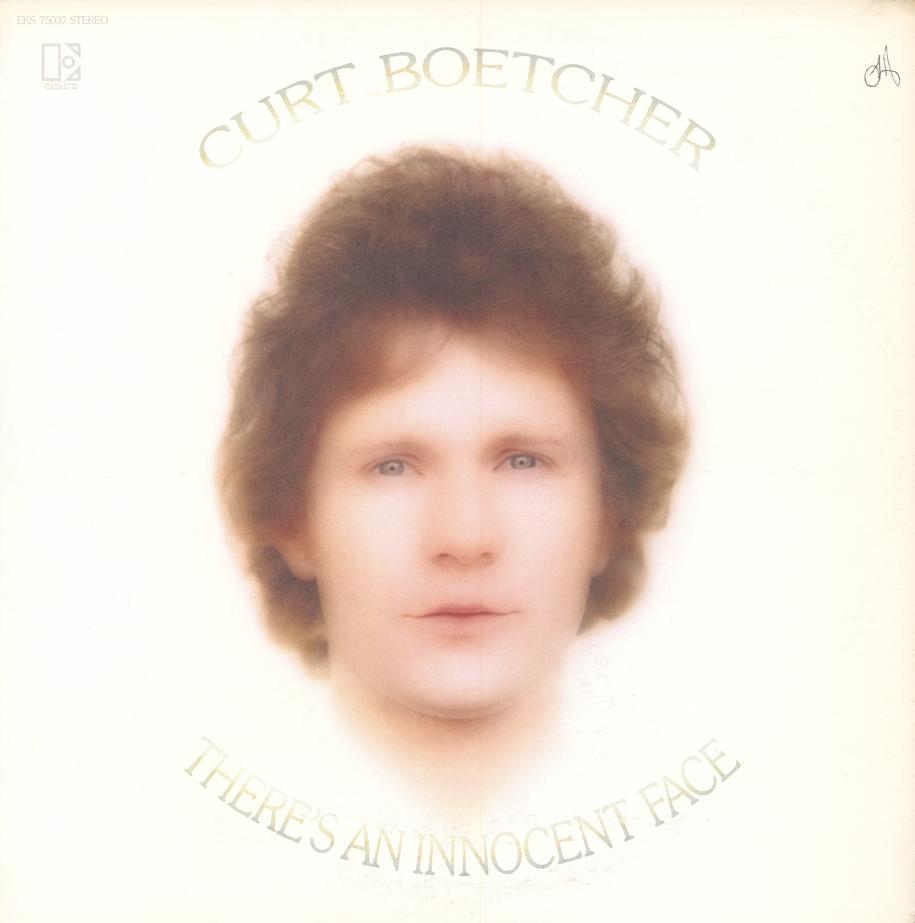
Really, pretty underrated!
I can't find the source of this at the moment, but there's this incredibly funny anecdote from the very start of the album's sessions, where Curt lugs an entire reel to reel tape machine up several flights of stairs into his apartment, only for it to not even turn on. Oops. From what I can tell, this album was originally planned to be credited to both Curt Boetcher and Web Burrel. I assume Curt's chronic pop star wannabe complex struck again. Not exactly a masterpiece, but very enjoyable west coast soft rock. She'll Stay With You has a few pretty funny doo wop quotes at the end of it. Wufferton Frog is silly, but also the most psychedelic track on the LP.
BAND WAGON (バンド ワゴン) by Shigeru Suzuki (鈴木茂)
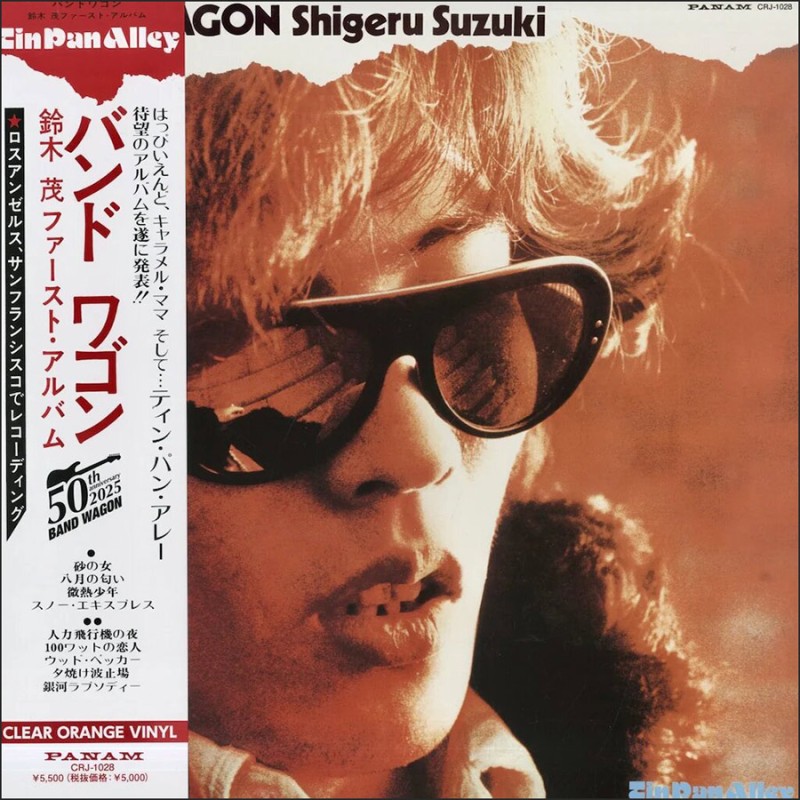
If Happy End is Japan's equivalent to The Beatles, then Shigeru Suzuki's Band Wagon is his equivalent to All Things Must Pass. This should immediately make the whole Beatles comparison seem misplaced, and it is, but these two albums do share one important aspect. This album is where Shigeru finally gets to let loose and fucking RIP on a full album of original compositions, but unlike ATMP, he didn't have to marinate on being his band's most underrated member for more than a couple of years. This album was recorded in LA, so the backing musicians on this album are mostly from bands like Santana and Little Feat. This gives the album an unusual sound unlike a lot of other albums released contemporaneously by his bandmates, and even by Suzuki's own standards. His career after this shifts pretty abruptly into city pop/soft rock, which some people might find a bit of a shame, but it's all very good city pop, so it's fine.
Favorite tracks: Susa No Onna, Bisetsu Shonen, 100 Watto No Koibito, Ginga Rhapsody
春がいっぱい (Spring is Nearly Here) by Kenji Omura (1981)
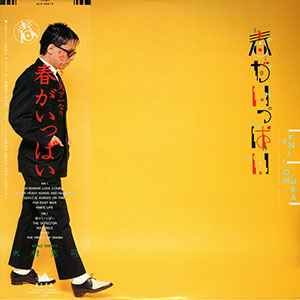
Kenji Omura makes an impressive shift from somewhat bland jazz-fusion/city pop (see KENJI SHOCK... well I sure wasn't!) to full on exciting new wavey synthpop, helped in large part via his association with and direct participation by all three members of Yellow Magic Orchestra. Yukihiro Takahashi produces the album, and also writes several of the best songs on it. Ryuichi Sakamoto and Harumi Hosono are also all over this thing, as well as YMO lyricists Chris Mosdell and Peter Barakan. It's really wild how many of these YMO-era solo projects are completely collaborative efforts, vs having the artist credited completely dominate the proceedings.
How is the music itself? Well, there's a strong variety in the proceedings, and although there's nothing that could really be called truly groundbreaking by the standards of the personnel populating the project, the quality is mostly high. There's your usual YMO-ey tropes, such as Far East Man being your obligatory cover track (the title track also counts), Seiko Is Always On Time sounding exactly like a Ryuichi Sakamoto track dug up from the vaults (though it's a co-write with Omura), and Inaudible being the random musique concrete track. The Defector, written by Takahashi and Barakan, really could be taken from an album like Neuromantic, and it's a testament to who Takahashi really was that he'd just give a banger track like that away to Omura. Maps is basically just as good, though I can't really tell if the lyrics on it are goofy, or just kind of paranoid.
YMO - BGM (1981)
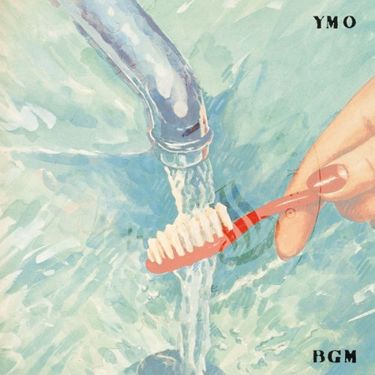
Historically speaking, this album is very significant as the first to use the Roland TR-808 drum machine, which would later become THE most famous drum machine ever created. The entire album is just as forward-looking, which I think still contributes to people not quite getting it. While the album does sound a lot like the cover, you also get the sense that the entire thing is frozen, completely covered in ice, without a single bit of warmth to be found within the music. This doesn't make the album worse by any stretch. In a certain sense, this actually corresponds to the state of YMO while they were making it, with the members at odds, and Ryuichi Sakamoto playing a relatively minimal part in the actual creation of the record. Despite the creative friction, the end product is just as good as any of the other albums in the band's discog, and is well worth a listen. Personally, I don't think it's aged a day.
Yukihiro Takahashi - Neuromantic (1981)
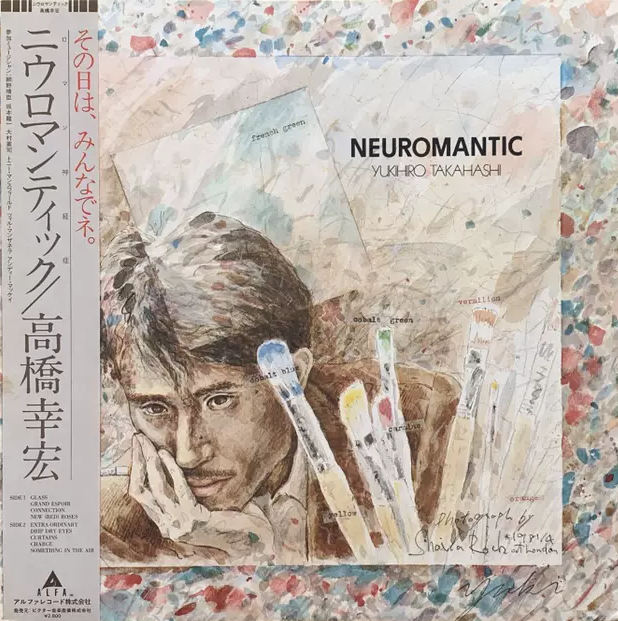
Yukihiro Takahashi takes the New Romantic paradigm, and soaks it in trademark early 80's YMO synthesizers to create a project that is truly special. Sure, it's a pop album through and through, but it's a pop album of the highest quality! I cannot recommend this album highly enough for those who are into this sort of thing. Drip Dry Eyes and Something In The Air are worth a listen even if you aren't. On an unrelated final note, I really don't get people who say that Yukki sounds like David Bowie. He just sounds like himself.
Mike Love - Looking Back With Love (1981)
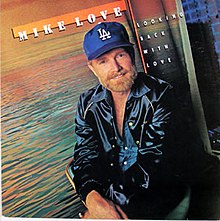
It's not that bad. Really!
That's probably the best thing you can say about this album. People talk about this like it's the ultimate essence of Mike Love's shittiness as an artist, like it's a complete failure on multiple levels. This is complete nonsense. This is Mike Love scrubbed clean and sanitized a la Keepin' the Summer Alive for "maximum profit". Seeing as that album is also one of the most despised in the Beach Boys's discography... yeah, why am I calling this album okay again? Personally, it's mostly because of Bruce Johnston's absence from production duties. This album was mostly produced by a just-past-disco era Curt Becher, who doesn't have the psychotic urge to turn everything into sonic mush, but instead sounds like someone who really wished that the 60's were cool again. This is probably not just a reflection of Curt's attitude in particular, but of the whole main brains of the album. Actually, the main thing I wanted to talk about in this review is the sort of weird malaise that a lot of these famous 60's LA scene guys went through in the early 80's. So many of these dudes seem to have hit rock bottom in the early 80's hard enough to basically completely sell out, and the sheer amount of the worst worst music you can imagine stems from this very odd 60's/80's blend that this one scene in particular tried to keep redoing over and over again. There's actually some pretty great projects which have an interesting and unique sound, but Looking Back With Love is definitely not one of them. Good listening for if you have nothing else really going on, except for Rockin' In The Boat. That one makes me wonder if The Beach Boys really were trying to put weird sexually voyeuristic songs in their albums on purpose.
Ryuichi Sakamoto & Danceries - The End of Asia (1982)
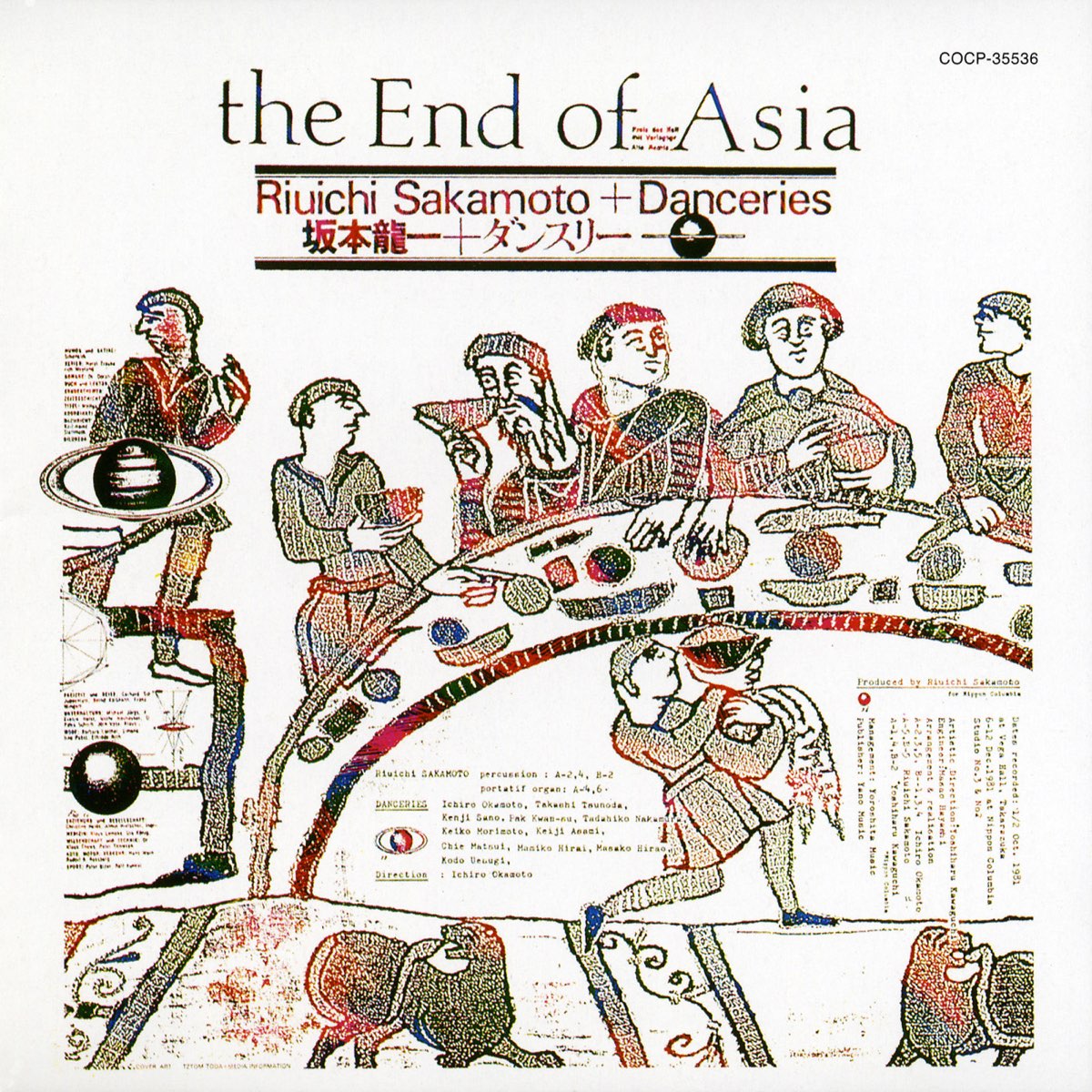
Ryuichi Sakamoto produces and collaborates with an early music ensemble with a combination of traditional medieval songs and his own compositions for what turns out to be quite an experience.
Yukihiro Takahashi - Once A Fool... (1985)
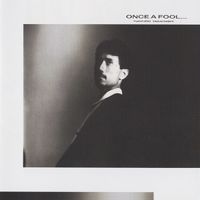
This is where the slump in Takahashi's output really starts to becomes apparent. He's clearly lost something, but what could that something be? He'll get it back, much farther down the line, but he becomes too focused on refining his pop style into something which manages to lose any sense of individuality...
Charli xcx - BRAT (2024)
.png)
I personally think that managing the balance between club-ready jams and highly personal confessional utterances as well as this album does is a hell of an achivement, but what does it really mean at the end of the day?
Ryuichi Sakamoto - Opus (2024)
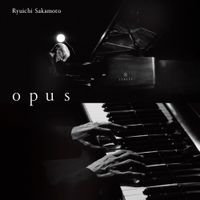
A haunting experience. Sakamoto takes works from every era of his career and boils them down to the bare essentials, quite literally giving his all while suffering from the cancer that inevitably took his life. Not every artist has the chance or the inclination to put a bow on their career, nor do they normally turn out quite as well as this one has. Highly recommended. I still haven't had the chance to check out the film which this is technically a soundtrack for.